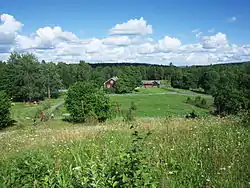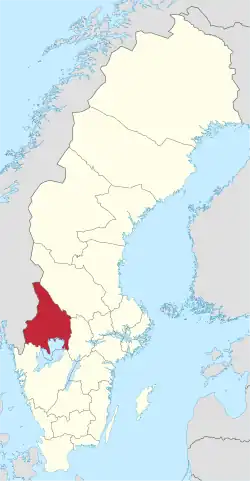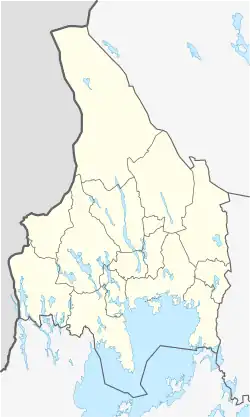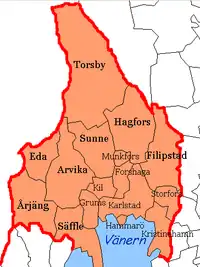Värmland County
Värmland County (Swedish: Värmlands län) is a county or län in west central Sweden. It borders the Swedish counties of Dalarna, Örebro and Västra Götaland, as well as the Norwegian counties of Viken and Innlandet to the west. Prince Carl Philip is Duke of Värmland.
Värmland County
| |
|---|---|
 | |
 Flag  Coat of arms | |
 Värmland County in Sweden | |
 Location map of Värmland County in Sweden | |
| Country | |
| Founded | 1779 |
| Capital | Karlstad |
| Municipalities | |
| Government | |
| • Governor | Georg Andrén |
| • Council | Region Värmland |
| Area | |
| • Total | 17,591.0 km2 (6,791.9 sq mi) |
| Population (30 September 2017)[1] | |
| • Total | 279,999 |
| • Density | 16/km2 (41/sq mi) |
| Time zone | UTC+1 (CET) |
| • Summer (DST) | UTC+2 (CEST) |
| ISO 3166 code | SE-S |
| GDP/ Nominal | SEK 59,497 million (2004) |
| GDP per capita | SEK 217,000 |
| NUTS Region | SE311 |
| Website | www |
Province
The county has more or less the same boundaries as Värmland Province, except that the municipalities of Karlskoga and Degerfors are part of Örebro County.
Administration
Värmland County was formed in 1779, when it was separated from Närke and Värmland County.
The main aim of the County Administrative Board is to fulfil the goals set in national politics by the Riksdag and the Government, to coordinate the interests of the county, to promote the development of the county, to establish regional goals and safeguard the due process of law in the handling of each case. The County Administrative Board is a Government Agency headed by a Governor. See List of Värmland Governors.
Politics
The County Council of Värmland is called Region Värmland.
Riksdag elections
The table details all Riksdag election results of Värmland County since the unicameral era began in 1970. The blocs denote which party would support the Prime Minister or the lead opposition party towards the end of the elected parliament.
| Year | Turnout | Votes | V | S | MP | C | L | KD | M | SD | NyD | Left | Right |
|---|---|---|---|---|---|---|---|---|---|---|---|---|---|
| 1970[2] | 88.9 | 183,757 | 4.3 | 51.1 | 20.1 | 14.3 | 2.2 | 7.6 | 55.9 | 42.7 | |||
| 1973[3] | 91.6 | 188,565 | 4.9 | 48.3 | 26.0 | 8.8 | 1.0 | 10.5 | 53.2 | 45.4 | |||
| 1976[4] | 92.2 | 196,183 | 4.0 | 46.1 | 25.8 | 9.8 | 0.7 | 13.2 | 50.1 | 48.8 | |||
| 1979[5] | 91.2 | 195,704 | 4.9 | 47.7 | 20.2 | 8.6 | 0.8 | 17.2 | 52.5 | 46.1 | |||
| 1982[6] | 91.6 | 196,415 | 4.8 | 50.4 | 1.4 | 17.0 | 5.3 | 1.1 | 20.0 | 55.2 | 42.2 | ||
| 1985[7] | 89.8 | 192,892 | 4.8 | 49.4 | 1.4 | 13.5 | 12.1 | 18.6 | 54.2 | 44.3 | |||
| 1988[8] | 85.3 | 182,427 | 5.4 | 49.2 | 4.6 | 14.1 | 10.1 | 1.8 | 14.7 | 59.1 | 38.9 | ||
| 1991[9] | 86.4 | 184,819 | 4.6 | 42.9 | 2.6 | 10.7 | 7.5 | 6.3 | 17.9 | 7.0 | 47.5 | 42.4 | |
| 1994[10] | 86.6 | 185,145 | 6.8 | 49.7 | 4.4 | 9.4 | 6.2 | 3.4 | 18.6 | 1.0 | 60.9 | 37.5 | |
| 1998[11] | 81.0 | 169,723 | 14.1 | 41.1 | 4.1 | 6.4 | 4.0 | 10.7 | 18.4 | 59.2 | 39.5 | ||
| 2002[12] | 79.8 | 165,413 | 8.7 | 43.4 | 4.0 | 9.2 | 11.5 | 8.1 | 12.4 | 1.4 | 56.0 | 41.1 | |
| 2006[13] | 81.3 | 168,426 | 6.4 | 42.0 | 3.9 | 10.0 | 6.0 | 5.8 | 20.9 | 2.9 | 52.3 | 42.7 | |
| 2010[14] | 84.1 | 177,215 | 5.8 | 38.9 | 5.6 | 7.6 | 6.0 | 4.7 | 25.7 | 4.8 | 50.1 | 44.0 | |
| 2014[15] | 86.0 | 182,077 | 5.2 | 39.1 | 5.2 | 7.4 | 4.1 | 4.0 | 19.6 | 12.6 | 49.5 | 35.2 | |
| 2018[16] | 87.3 | 183,966 | 7.0 | 33.9 | 3.3 | 9.3 | 4.4 | 6.3 | 16.4 | 18.0 | 53.2 | 45.3 | |
| 2022[17] | 85.2 | 184,607 | 5.0 | 34.6 | 3.6 | 6.3 | 3.7 | 5.8 | 17.1 | 22.8 | 49.5 | 49.4 |
Demographics
Foreign background
SCB have collected statistics on backgrounds of residents since 2002. These tables consist of all who have two foreign-born parents or are born abroad themselves.[18] The chart lists election years and the last year on record alone.
| Location | 2002 | 2006 | 2010 | 2014 | 2018 | 2019 |
|---|---|---|---|---|---|---|
| Arvika | 8.8 | 10.4 | 11.8 | 13.0 | 14.9 | 15.1 |
| Eda | 20.7 | 23.8 | 26.1 | 27.7 | 31.1 | 31.7 |
| Filipstad | 8.6 | 10.1 | 12.1 | 16.4 | 22.8 | 22.5 |
| Forshaga | 6.0 | 7.0 | 7.3 | 8.8 | 11.0 | 10.8 |
| Grums | 8.1 | 8.8 | 9.8 | 11.0 | 13.0 | 13.5 |
| Hagfors | 6.2 | 7.8 | 9.7 | 12.2 | 15.6 | 16.1 |
| Hammarö | 7.0 | 7.0 | 7.4 | 7.6 | 9.1 | 8.9 |
| Karlstad | 9.5 | 11.0 | 12.8 | 14.0 | 16.8 | 17.6 |
| Kil | 6.4 | 6.9 | 7.3 | 8.2 | 9.0 | 9.5 |
| Kristinehamn | 8.3 | 9.6 | 11.1 | 14.2 | 17.1 | 17.5 |
| Munkfors | 5.3 | 6.9 | 8.3 | 10.5 | 16.5 | 16.3 |
| Storfors | 14.7 | 16.7 | 18.6 | 22.1 | 22.6 | 20.8 |
| Sunne | 4.8 | 5.5 | 6.6 | 8.4 | 11.5 | 11.6 |
| Säffle | 5.7 | 7.2 | 8.5 | 11.9 | 17.1 | 17.1 |
| Torsby | 6.7 | 8.3 | 10.3 | 12.2 | 14.1 | 14.7 |
| Årjäng | 15.0 | 17.4 | 19.4 | 21.7 | 24.8 | 25.5 |
| Total | 8.6 | 10.0 | 11.5 | 13.3 | 16.1 | 16.5 |
| Source: SCB [18] | ||||||
Climate
Värmland being a landlocked county results in greater temperature differences than at the nearby west coast of Sweden and south coast of Norway. As a result, the southern areas of the county has a humid continental climate with strong oceanic influences. The latter climate type is prevalent in a small area at the shores of Lake Vänern due to recent warming. More northerly areas see a subarctic climate with relatively mild winters for the climate type. The subarctic classification of areas such as Hagfors and Torsby is more due to the cool summer nights that renders September below 10 °C (50 °F) in mean temperatures.
| Climate data for Karlstad, 2002-2015, extremes from 1901, precipitation 1961-1990 | |||||||||||||
|---|---|---|---|---|---|---|---|---|---|---|---|---|---|
| Month | Jan | Feb | Mar | Apr | May | Jun | Jul | Aug | Sep | Oct | Nov | Dec | Year |
| Record high °C (°F) | 10.2 (50.4) |
12.6 (54.7) |
20.1 (68.2) |
25.8 (78.4) |
29.0 (84.2) |
32.5 (90.5) |
34.0 (93.2) |
32.0 (89.6) |
25.2 (77.4) |
20.0 (68.0) |
14.7 (58.5) |
11.5 (52.7) |
34.0 (93.2) |
| Average high °C (°F) | −0.2 (31.6) |
0.6 (33.1) |
5.2 (41.4) |
11.5 (52.7) |
16.2 (61.2) |
20.1 (68.2) |
22.6 (72.7) |
21.3 (70.3) |
16.8 (62.2) |
9.9 (49.8) |
5.0 (41.0) |
1.1 (34.0) |
10.8 (51.4) |
| Daily mean °C (°F) | −2.6 (27.3) |
−2.3 (27.9) |
0.9 (33.6) |
6.1 (43.0) |
10.9 (51.6) |
14.7 (58.5) |
17.6 (63.7) |
16.5 (61.7) |
12.3 (54.1) |
6.5 (43.7) |
2.5 (36.5) |
−1.6 (29.1) |
6.7 (44.1) |
| Average low °C (°F) | −5.1 (22.8) |
−5.2 (22.6) |
−3.3 (26.1) |
0.8 (33.4) |
5.6 (42.1) |
9.4 (48.9) |
12.7 (54.9) |
11.7 (53.1) |
7.7 (45.9) |
3.1 (37.6) |
0.1 (32.2) |
−4.3 (24.3) |
2.7 (36.9) |
| Record low °C (°F) | −32.5 (−26.5) |
−36.0 (−32.8) |
−26.9 (−16.4) |
−18.4 (−1.1) |
−5.0 (23.0) |
−1.8 (28.8) |
3.5 (38.3) |
1.0 (33.8) |
−5.0 (23.0) |
−12.0 (10.4) |
−19.9 (−3.8) |
−28.0 (−18.4) |
−36.0 (−32.8) |
| Average precipitation mm (inches) | 46.1 (1.81) |
32.8 (1.29) |
38.8 (1.53) |
39.0 (1.54) |
43.9 (1.73) |
56.3 (2.22) |
65.4 (2.57) |
76.1 (3.00) |
73.0 (2.87) |
70.7 (2.78) |
72.6 (2.86) |
50.7 (2.00) |
665.3 (26.19) |
| Mean monthly sunshine hours | 47 | 70 | 174 | 220 | 254 | 287 | 265 | 223 | 181 | 103 | 48 | 44 | 1,916 |
| Source 1: [19] | |||||||||||||
| Source 2: [20] | |||||||||||||
| Climate data for Arvika (roughly 50 km north of Karlstad) — Extremes 1945-present, precipitation 1961-1990 | |||||||||||||
|---|---|---|---|---|---|---|---|---|---|---|---|---|---|
| Month | Jan | Feb | Mar | Apr | May | Jun | Jul | Aug | Sep | Oct | Nov | Dec | Year |
| Record high °C (°F) | 10.2 (50.4) |
11.8 (53.2) |
20.4 (68.7) |
25.5 (77.9) |
29.8 (85.6) |
33.8 (92.8) |
32.8 (91.0) |
33.9 (93.0) |
28.0 (82.4) |
20.4 (68.7) |
15.2 (59.4) |
13.0 (55.4) |
33.9 (93.0) |
| Average high °C (°F) | −0.6 (30.9) |
0.5 (32.9) |
5.6 (42.1) |
11.8 (53.2) |
16.6 (61.9) |
20.7 (69.3) |
22.9 (73.2) |
21.4 (70.5) |
16.9 (62.4) |
9.9 (49.8) |
4.9 (40.8) |
0.3 (32.5) |
10.9 (51.6) |
| Daily mean °C (°F) | −4.4 (24.1) |
−3.8 (25.2) |
−0.2 (31.6) |
5.4 (41.7) |
10.2 (50.4) |
14.2 (57.6) |
16.9 (62.4) |
15.4 (59.7) |
11.0 (51.8) |
5.3 (41.5) |
1.6 (34.9) |
−3.3 (26.1) |
5.6 (42.1) |
| Average low °C (°F) | −8.2 (17.2) |
−8.2 (17.2) |
−6.0 (21.2) |
−0.9 (30.4) |
3.8 (38.8) |
7.7 (45.9) |
10.8 (51.4) |
9.5 (49.1) |
5.1 (41.2) |
0.8 (33.4) |
−1.7 (28.9) |
−7.0 (19.4) |
0.4 (32.7) |
| Record low °C (°F) | −35.5 (−31.9) |
−38.0 (−36.4) |
−30.0 (−22.0) |
−16.0 (3.2) |
−6.7 (19.9) |
−3.4 (25.9) |
1.2 (34.2) |
−1.9 (28.6) |
−7.0 (19.4) |
−14.5 (5.9) |
−24.0 (−11.2) |
−31.9 (−25.4) |
−38.0 (−36.4) |
| Average precipitation mm (inches) | 43.5 (1.71) |
30.8 (1.21) |
31.5 (1.24) |
37.6 (1.48) |
44.6 (1.76) |
62.0 (2.44) |
71.6 (2.82) |
80.8 (3.18) |
73.5 (2.89) |
71.5 (2.81) |
64.3 (2.53) |
44.5 (1.75) |
656.0 (25.83) |
| Source 1: [21] | |||||||||||||
| Source 2: [22] | |||||||||||||
| Climate data for Blomskog (southerly near Norwegian border) (2002-2015 temp averages, 1964-1990 precipitation, extremes since 1964) | |||||||||||||
|---|---|---|---|---|---|---|---|---|---|---|---|---|---|
| Month | Jan | Feb | Mar | Apr | May | Jun | Jul | Aug | Sep | Oct | Nov | Dec | Year |
| Record high °C (°F) | 10.0 (50.0) |
12.7 (54.9) |
20.0 (68.0) |
26.6 (79.9) |
28.6 (83.5) |
31.1 (88.0) |
32.7 (90.9) |
32.9 (91.2) |
25.6 (78.1) |
20.0 (68.0) |
13.8 (56.8) |
10.0 (50.0) |
32.9 (91.2) |
| Average high °C (°F) | 0.0 (32.0) |
0.4 (32.7) |
4.7 (40.5) |
10.8 (51.4) |
15.3 (59.5) |
19.2 (66.6) |
21.5 (70.7) |
20.2 (68.4) |
15.9 (60.6) |
9.5 (49.1) |
4.8 (40.6) |
0.9 (33.6) |
10.2 (50.4) |
| Daily mean °C (°F) | −2.7 (27.1) |
−2.6 (27.3) |
0.4 (32.7) |
5.5 (41.9) |
10.0 (50.0) |
13.7 (56.7) |
16.5 (61.7) |
15.5 (59.9) |
11.9 (53.4) |
6.1 (43.0) |
2.2 (36.0) |
−1.8 (28.8) |
6.2 (43.2) |
| Average low °C (°F) | −5.3 (22.5) |
−5.7 (21.7) |
−3.8 (25.2) |
0.2 (32.4) |
4.7 (40.5) |
8.3 (46.9) |
11.5 (52.7) |
10.8 (51.4) |
6.9 (44.4) |
2.7 (36.9) |
−0.3 (31.5) |
−4.6 (23.7) |
2.1 (35.8) |
| Record low °C (°F) | −32.4 (−26.3) |
−36.5 (−33.7) |
−27.0 (−16.6) |
−15.3 (4.5) |
−5.6 (21.9) |
−2.7 (27.1) |
0.9 (33.6) |
−2.0 (28.4) |
−6.8 (19.8) |
−14.2 (6.4) |
−25.4 (−13.7) |
−30.3 (−22.5) |
−36.5 (−33.7) |
| Average precipitation mm (inches) | 52.2 (2.06) |
37.1 (1.46) |
41.4 (1.63) |
38.1 (1.50) |
42.6 (1.68) |
55.9 (2.20) |
59.3 (2.33) |
70.1 (2.76) |
76.3 (3.00) |
78.8 (3.10) |
72.4 (2.85) |
52.1 (2.05) |
676.5 (26.63) |
| Source 1: SMHI Precipitation normals 1961-1990[23] | |||||||||||||
| Source 2: SMHI average data 2002-2015[24] | |||||||||||||
| Climate data for Gustavsfors (central Värmland) (2002-2015 temp averages, 1961-1990 precipitation, extremes since 1917) | |||||||||||||
|---|---|---|---|---|---|---|---|---|---|---|---|---|---|
| Month | Jan | Feb | Mar | Apr | May | Jun | Jul | Aug | Sep | Oct | Nov | Dec | Year |
| Record high °C (°F) | 8.8 (47.8) |
11.3 (52.3) |
17.7 (63.9) |
25.2 (77.4) |
28.5 (83.3) |
33.4 (92.1) |
33.4 (92.1) |
34.4 (93.9) |
27.2 (81.0) |
20.2 (68.4) |
13.1 (55.6) |
9.8 (49.6) |
34.4 (93.9) |
| Average high °C (°F) | −1.9 (28.6) |
−0.6 (30.9) |
3.4 (38.1) |
10.7 (51.3) |
15.4 (59.7) |
19.6 (67.3) |
22.0 (71.6) |
20.3 (68.5) |
15.6 (60.1) |
8.5 (47.3) |
3.4 (38.1) |
−1.3 (29.7) |
8.7 (47.7) |
| Daily mean °C (°F) | −5.8 (21.6) |
−5.2 (22.6) |
−2.0 (28.4) |
4.3 (39.7) |
9.0 (48.2) |
12.9 (55.2) |
15.8 (60.4) |
14.4 (57.9) |
9.8 (49.6) |
4.3 (39.7) |
0.2 (32.4) |
−4.9 (23.2) |
4.4 (39.9) |
| Average low °C (°F) | −9.6 (14.7) |
−9.6 (14.7) |
−7.4 (18.7) |
−2.2 (28.0) |
2.7 (36.9) |
6.3 (43.3) |
9.6 (49.3) |
8.4 (47.1) |
3.9 (39.0) |
0.0 (32.0) |
−3.0 (26.6) |
−8.5 (16.7) |
−0.7 (30.7) |
| Record low °C (°F) | −42.0 (−43.6) |
−38.0 (−36.4) |
−31.7 (−25.1) |
−26.6 (−15.9) |
−9.4 (15.1) |
−3.9 (25.0) |
−0.9 (30.4) |
−3.4 (25.9) |
−8.2 (17.2) |
−17.6 (0.3) |
−27.9 (−18.2) |
−35.4 (−31.7) |
−42.0 (−43.6) |
| Average precipitation mm (inches) | 41.7 (1.64) |
29.4 (1.16) |
34.6 (1.36) |
39.3 (1.55) |
48.2 (1.90) |
68.0 (2.68) |
79.9 (3.15) |
80.2 (3.16) |
75.6 (2.98) |
65.2 (2.57) |
62.3 (2.45) |
47.0 (1.85) |
671.3 (26.43) |
| Source 1: SMHI Precipitation normals 1961-1990[25] | |||||||||||||
| Source 2: SMHI average data Jan 2002 - Dec 2015[26] | |||||||||||||
Heraldry
The county of Värmland inherited its coat of arms from the province of the same name. When it is shown with a royal crown it represents the County Administrative Board. Blazon: "Argent, an Eagle displayed Azure beaked, langued and membered Gules."
See also
- Duke of Värmland, a title for members of the royal family (see Duchies in Sweden)
The title is presently held by Prince Carl Philip, Duke of Värmland - Egenäs
References and notes
- "Folkmängd i riket, län och kommuner 30 september 2017 och befolkningsförändringar 1 juli–30 september 2017. Totalt". Statistics Sweden. 8 November 2017. Retrieved 19 November 2017.
- "Riksdagsvalet 1970" (PDF). SCB. Retrieved 21 September 2021.
- "Riksdagsvalet 1973" (PDF) (in Swedish). SCB. Retrieved 14 September 2021.
- "Riksdagsvalet 1976" (PDF) (in Swedish). SCB. Retrieved 14 September 2021.
- "Riksdagsvalet 1979" (PDF) (in Swedish). SCB. Retrieved 14 September 2021.
- "Riksdagsvalet 1982)" (PDF) (in Swedish). SCB. Retrieved 14 September 2021.
- "Riksdagsvalet 1985" (PDF) (in Swedish). SCB. Retrieved 14 September 2021.
- "Riksdagsvalet 1988)" (PDF) (in Swedish). SCB. Retrieved 14 September 2021.
- "Riksdagsvalet 1991" (PDF) (in Swedish). SCB. Retrieved 14 September 2021.
- "Riksdagsvalet 1994" (PDF) (in Swedish). SCB. Retrieved 14 September 2021.
- "Riksdagsvalet 1998" (PDF) (in Swedish). SCB. Retrieved 14 September 2021.
- "Valresultat Riksdag 2002" (in Swedish). Valmyndigheten. Archived from the original on 7 September 2021. Retrieved 14 September 2021.
- "Allmänna val 17 september 2006" (in Swedish). Valmyndigheten. Archived from the original on 28 September 2021. Retrieved 14 September 2021.
- "Röster - Val 2010" (in Swedish). Valmyndigheten. Archived from the original on 28 August 2018. Retrieved 14 September 2021.
- "Röster - Val 2014" (in Swedish). Valmyndigheten. Archived from the original on 11 November 2020. Retrieved 14 September 2021.
- "Röster - Val 2018" (in Swedish). Valmyndigheten. Archived from the original on 28 August 2018. Retrieved 14 September 2021.
- "Valpresentation". resultat.val.se (in Swedish). Retrieved 2023-01-26.
- "PxWeb - välj variabler och värden" (in Swedish). SCB. Retrieved 11 August 2020.
- "Average Monthly & Yearly Data 2002-2014". SMHI. Archived from the original on 20 February 2015. Retrieved 16 April 2016.
- "Precipitation Normals 1961-1990". SMHI. Retrieved 23 May 2015.
- "Monthly & Yearly Statistics". SMHI. Archived from the original on 20 February 2015. Retrieved 27 May 2015.
- "Precipitation normals 1961-1990 (Arvika code 9240)". SMHI. Retrieved 8 April 2016.
- "Average Precipitation for Stations (Swedish)". Swedish Metereological and Hydrological Institute (Blomskog code 9213). Archived from the original on 2 May 2018. Retrieved 14 May 2016.
- "Annual and Monthly Statistics". SMHI. 14 May 2016. Archived from the original on 20 February 2015. Retrieved 17 May 2016.
- "Average Precipitation for Stations" (in Swedish). Swedish Metereological and Hydrological Institute (Gustavsfors code 10 309). Archived from the original on 2 May 2018. Retrieved 16 March 2016.
- "Annual & Monthly Statistics 2002-2015". SMHI. 16 March 2016. Archived from the original on 20 February 2015. Retrieved 17 May 2016.
